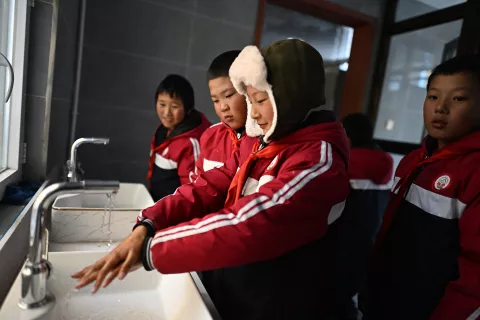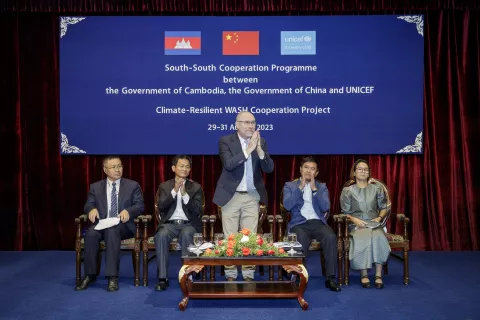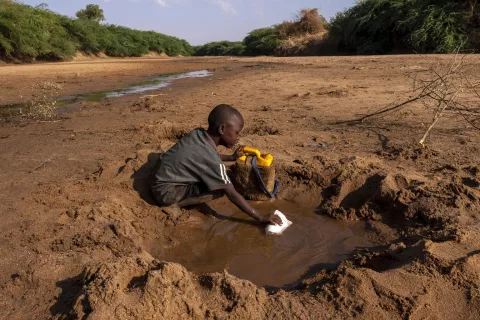Bringing safe water to the thirsty
Bringing safe water to the thirsty
For many it is the most basic stuff of life, available through the turn of a tap, but Qu Wenke and his fellow villagers remember the days when water meant toil.
The words of an old song depict the hardship. "Calluses on the shoulder, humps on the back. When drought comes, we search for water from dawn till night; when the rainy season comes, we rely on muddy water."
About 320 million rural Chinese live without a clean water supply. But a program initiated by the Ministry of Water Resources (MWR) that drew on the groundwork carried out by the United Nations Children's Fund (UNICEF) is trying to make tap water accessible to all.
No option
In Caomiao Village, Tongjiang County, southeast China's Sichuan Province, Qu, 53, has been troubled by water shortages all his life.
Living in steep mountains with little rainfall throughout the year, the villagers had to walk at least two kilometers to carry water from rivers.
"Everyday, I walked back and forth three or four times. Carrying water with shoulder poles is exhausting," says Qu. Due to its scarcity, water was "much more precious than oil". "After all the family had washed their faces and feet, the water would be used to feed the pigs."
While the hard work was routine, the water quality was alarming. Qu often found blood flukes and other "red worms" in the water. About half the villagers were diagnosed as having tuberculosis or hepatitis, which they attributed to the dirty water. The swelling of knee or finger joints left nine villagers unable to work. Some of Qu's neighbors developed kidney stones. "We were concerned about the water we drank, but we had no option."
Tongjiang County, a revolutionary base during the Communist Party of China's Long March in the 1930s, has 295,000 people, 40 percent of the population, who are short of safe, clean water, according to a provincial survey in 2004. The drinking water has high levels of fluorine, salt and other contaminants and tastes bitter, says Yang Yongchao, chief of the county's Bureau of Water Resources.
Applauded program
In 2006, the Sichuan Rural Water Supply Bureau began to implement a project named Sichuan Safe Drinking Water covering 31 million rural citizens.
With funding from the central and provincial governments as well as farmers, more than 190, 000 water stations or individual tap water facilities were set up by the end of 2007.
With tap water available, living standards have improved. "Noticeably fewer people catch cold after the tap water is linked to their homes," says Qu. In the past, he showered once a month, but now it is once a week. He has also bought a twin-tub washing machine. "In terms of life quality, we can rival emperors in the Forbidden City, right?"
The villagers pay 2.9 RMB (0.4 US dollars) for each ton of tap water, which Qu believes is a "a reasonable price" as it saves time and energy.
Yan Min, the county magistrate, estimates that 2.3 million yuan (330,000 US dollars) worth of medical costs can be saved every year thanks to the introduction of tap water.
Tap water has also introduced self-governance to many villages.
"A large number of the villagers cared how the project was carried out, from beginning to end," says Yang Shushun, party secretary of Caomiao. They held three meetings before the water supply station was built, and every detail was made public on the village blackboard.
Each household has received a property right license to the water tap. Conservation awareness has also improved. "We'll protect the 20, 000 cubic meter reservoir, which is our village's central water resource, from pollution," says Qu.
At Liushudian Village in the adjacent Yilong County, the villagers set up a self-governing water supply association, which is responsible for water supply to 403 households. "All matters, including charges, are posted on the wall for public review," says director Li Wanshu.
UNICEF experience
Before the UN Millennium Declaration in 2000, the Chinese government had largely neglected the construction of rural water supply systems. The UN document stipulated that by 2015, the population without access to secure water be halved.
Since then, the government has increased spending on rural water supplies. From 2001 to 2005, around 67 million people were given water supplies.
From 2004, the target has shifted to water security, which is measured by four criteria: quality, daily intake, convenience of access, and continuity of supply.
During the 11th Five Year Plan (2006-2010), the government has committed itself to provide water security to 32 million rural people annually, said Minister of Water Resources Chen Lei earlier this year.
Rong Guang, a MWR official, commends UNICEF for playing an important role in promoting water supply in rural China.
In the mid-1980s, UNICEF began to implement the Children's Environment and Sanitation (CES) Project in Yunnan Province, extending it to six provinces from 1996 to 2000 and three more provinces from 2001 to 2005. Sichuan Province was incorporated in the pilot program in 1998.
A major feature of the project is its emphasis on the integration of water, environment and sanitation, explains Lei Jun, officer for water and environmental program of UNICEF.
In the 1990s, UNICEF funded the installation of 6,598 deep pumps in the targeted provinces. In Sichuan, 300 pumps were installed in Pingyang County and Mabian County.
Li Daqun, a farmer of Hongmiao Village, Pingchang County, says the pump installed in 1999 still effectively provides water to her community.
Before the arrival of the 2,000-yuan (286 US dollars) pump, Li had to use the bamboo basket to carry water home. Since 1999, she has raised 20 pigs, increasing her annual income by 10,000 yuan (1429 US dollars).
"UNICEF paved way for the government's emphasis on rural water supply," says Rong Guang.
However, many difficulties remain. For instance, electricity costs account for about half of the cost of water supply, says Zhang Lei, an official of Sichuan Rural Water Supply Bureau. He advises the electricity fee be reduced by two thirds so that more farmers can afford tap water.
Rong Guang admits that little consideration has been given to sanitation in the nationwide secure water projects. In January, the Ministry of Health, the National Development and Reform Commission and the Ministry of Water Resources issued a regulation on monitoring water quality in the rural areas.
But it requires the input of money and personnel, which is beyond many water supply stations. Sun Hai, the head of Yuntai Water Supply Station of Tongjiang County, says they can't guarantee regular quality testing as a comprehensive test costs 800 yuan (114 US dollars) "It's too expensive."




